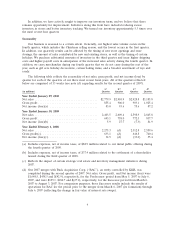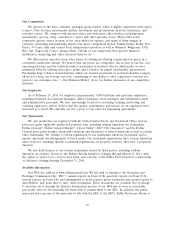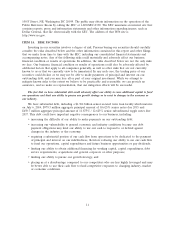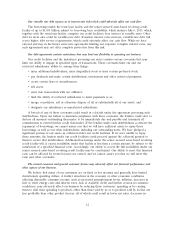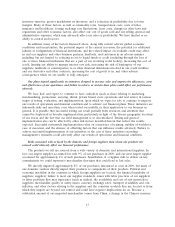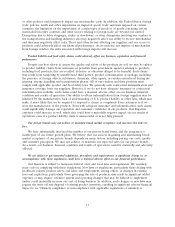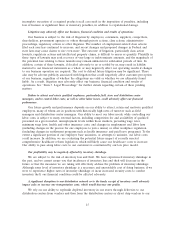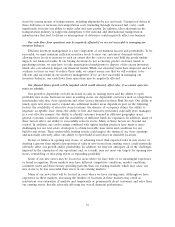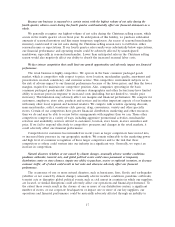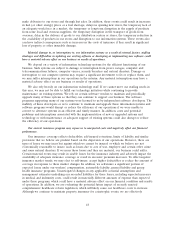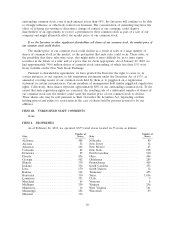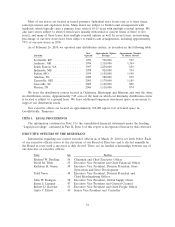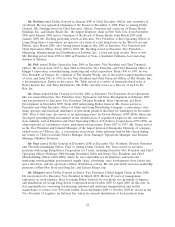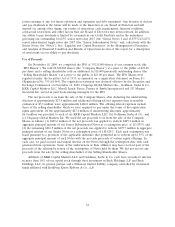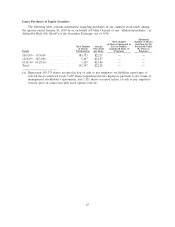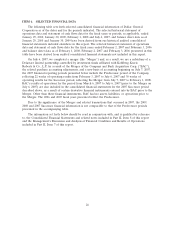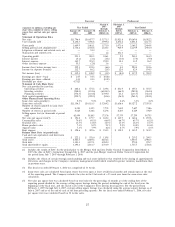Dollar General 2009 Annual Report Download - page 30
Download and view the complete annual report
Please find page 30 of the 2009 Dollar General annual report below. You can navigate through the pages in the report by either clicking on the pages listed below, or by using the keyword search tool below to find specific information within the annual report.self-insured for property losses up to the amount of our deductibles. If we experience a greater number
of these losses than we anticipate, our financial performance could be adversely affected.
If we fail to protect our brand name, competitors may adopt tradenames that dilute the value of our
brand name.
We may be unable or unwilling to strictly enforce our trademark in each jurisdiction in which we
do business. Also, we may not always be able to successfully enforce our trademarks against
competitors, or against challenges by others. Our failure to successfully protect our trademarks could
diminish the value and efficacy of our brand recognition, and could cause customer confusion, which
could, in turn, adversely affect our sales and profitability.
Our success depends on our executive officers and other key personnel. If we lose key personnel or are
unable to hire additional qualified personnel, our business may be harmed.
Our future success depends to a significant degree on the skills, experience and efforts of our
executive officers and other key personnel. The loss of the services of any of our executive officers,
particularly Richard W. Dreiling, our Chief Executive Officer, could have a material adverse effect on
our operations. Our future success will also depend on our ability to attract and retain qualified
personnel and a failure to attract and retain new qualified personnel could have an adverse effect on
our operations. We do not currently maintain key person life insurance policies with respect to our
executive officers or key personnel.
We face risks related to protection of customers’ credit card data.
In connection with credit card sales, we transmit confidential credit card information. Third parties
may have the technology or know-how to breach the security of this customer information, and our
security measures and those of our technology vendors may not effectively prohibit others from
obtaining improper access to this information. Any security breach could expose us to risks of data loss,
litigation and liability and could seriously disrupt our operations and any resulting negative publicity
could significantly harm our reputation.
Kohlberg Kravis Roberts & Co., L.P. (‘‘KKR’’), certain affiliates of Goldman, Sachs & Co. (the ‘‘GS
Investors’’), and other equity co-investors (collectively, the ‘‘Investors’’) have significant influence over us,
including control over decisions that require the approval of shareholders, which could limit your ability to
influence the outcome of key transactions, including a change of control.
We are controlled by the Investors. The Investors have an indirect interest in over 85% of our
outstanding common stock through their investment in Buck Holdings, L.P. In addition, the Investors
have the ability to elect our entire Board of Directors. As a result, the Investors have control over our
decisions to enter into any corporate transaction and the ability to prevent any transaction that requires
shareholder approval regardless of whether others believe that the transaction is in our best interests.
As long as the Investors continue to have an indirect interest in a majority of our outstanding common
stock, they will have the ability to control the vote in any election of directors. In addition, pursuant to
a shareholders’ agreement that we entered into with Buck Holdings, L.P., KKR and the GS Investors,
KKR has a consent right over certain significant corporate actions and KKR and the GS Investors have
certain rights to appoint directors to our Board and its committees.
The Investors are also in the business of making investments in companies and may from time to
time acquire and hold interests in businesses that compete directly or indirectly with us. The Investors
may also pursue acquisition opportunities that are complementary to our business, and, as a result,
those acquisition opportunities may not be available to us. So long as the Investors, or other funds
controlled by or associated with the Investors, continue to indirectly own a significant amount of our
19


